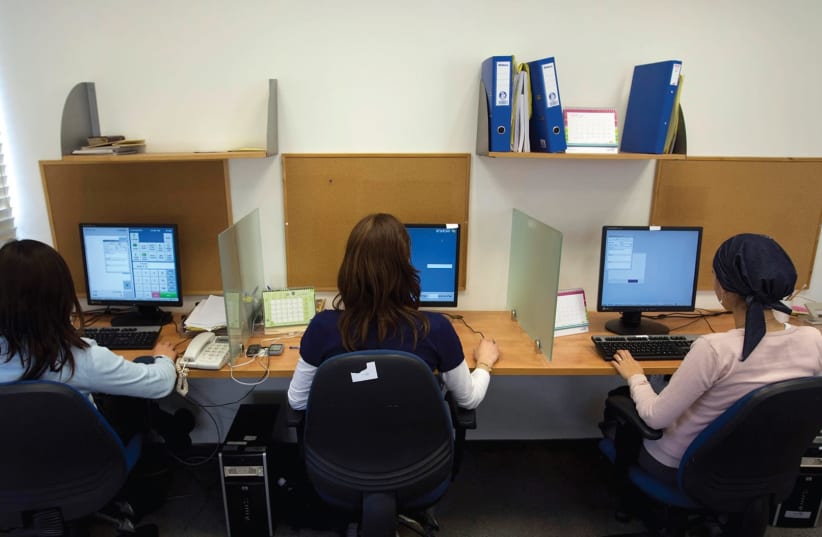Too many haredi (ultra-Orthodox) women are studying for teaching degrees and receiving state subsidies for these qualifications, since there are too few jobs in the haredi education sector for them. And there are not enough haredi men able to teach core curriculum subjects, for whom state subsidies were reduced.
These are the key findings of the State Comptroller’s Report on state efforts to increase the number of haredi men and women obtaining higher-education qualifications and thus increase haredi employment and productivity.
The report focused on the state-funded program from 2011 to 2016 carried out by the Council for Higher Education (CHE), and a second program from 2016 to 2022, to increase the number of haredim in higher education, programs which have been allocated NIS 1.7 billion.
The report noted that while the number of haredi men and women in higher education increased over the course of the first program by 48%, the targets set were missed by some 20%.
In addition, the report found that the number of haredi men in higher education was significantly lower than the number of haredi women, just as male haredi employment is substantially below that of men from the rest of the population.
Despite this, the program for increasing haredi participation in higher education did not establish a goal of specifically increasing the number of haredi men entering such courses, and the percentage of haredi men – as compared to haredi women – studying in higher education frameworks actually fell from 2011 to 2016.
Furthermore, in the second stage of the program from 2016 to 2022, the number of stipends available to haredi men has actually been reduced.
Another problem highlighted by the report is the well-known issue of haredi students dropping out of their study programs. According to the report, some 46% of haredi men fail to complete their degree for higher education qualification, compared to 20% among male students from the general population. And 28% of haredi women fail to complete their course compared to 12% of other women.
The report noted that the CHE has not established a goal of reducing dropout rates.
One critical problem highlighted by the report is that there are too many haredi women studying for higher education qualifications in teaching when there are not enough jobs for them in the haredi education sector, and the majority of haredi women graduate in teaching work outside the field of education.
According to the report, some 78% of haredi graduates between 2011 and 2017 were women, 44% of whom studied teaching and education.
There are some 6,500 haredi women who obtain teaching qualifications every year, while the haredi education sector needs just 1,500 female teachers a year; there is currently no lack of haredi women teachers in any school subject.
There is, however, a lack of male haredi teachers. But since in the haredi sector, men usually teach boys and women usually teach girls, the excess of haredi female teachers cannot be used to offset the lack of male teachers.
The report found that the majority of haredi men and women who obtained teaching and education qualifications between 2012 and 2016 do not work in those fields, including 63% of men and 88% of women, thereby calling into question the efficacy of the high level of funding the state has allocated for the program to increase haredi participation in higher education.
Despite these problems, the number of haredi men and women studying for education and teaching qualifications continues to increase.
The report also noted that in September 2016, the CHE actually increased the number of women eligible for state-funded stipends, and reduced the number of men eligible for these stipends in 2017.
The State Comptroller’s Report also found deficiencies in the quality of some of the authorized courses for haredi men and women it examined from 2014 to 2017, and noted that the academic level of the course was not sufficient.
It also accused the CHE of failing to properly examine the quality of these courses and to ensure that the level and quality of the course was the same in those designated for the haredi sector as the quality of the courses taught at the institution in question’s courses for the general population.
The report concluded that the CHE must establish targets for increasing the number of haredi men in higher education.
It also stated that incentives for haredi women to study education and teaching must be reduced because of the lack of employment opportunities for such graduates, and that the CHE must encourage the study of disciplines for which there is a proven market need, as established in the 2016 agreement between the CHE and the Finance Ministry.
The report also instructed the CHE to reduce the dropout rate of haredi men and women from academic studies by providing prior preparation for haredi students and through appropriate support for them during the course of their study program.
Furthermore, in light of severe deficiencies in the general education of haredi men who enter higher education due to the fact that they in the main they do not study core curriculum subjects in high school, the establishment of academies for completing the high-school diploma before entering higher-education should be considered.
It also stated that the CHE must better perform its quality inspection of the courses it subsidies to ensure that the level of studies for haredi men and women is the same as for the general population.
